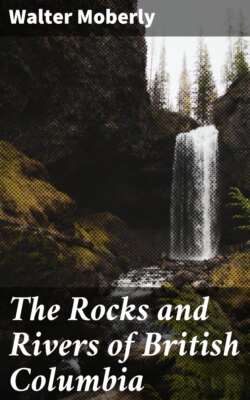Читать книгу The Rocks and Rivers of British Columbia - Walter Moberly - Страница 11
На сайте Литреса книга снята с продажи.
CHAPTER IX.
ОглавлениеTable of Contents
In the morning I managed to hire an Indian to pack my blankets, &c., over the twenty-nine mile portage by a trail opened by the Government in the previous autumn at great cost. The snow was very deep and the trail unbroken. After toiling for a long time through the snow we reached the top of a hill that commands a view up the foaming Lillovet River for some distance, when my Indian sat down and we both had a smoke and rest. He tried to explain something to me, but I could not understand him; so when I thought we had rested long enough, I took the pack and put it on his back, at which he grew very indignant, talking away in an excited manner, pointing up the river, and at last flinging my pack down and leaving me. There was now nothing for me to do but pack it myself, so I accordingly shouldered it and tried to get along. After an hour’s excessively hard work I found I had made hardly any headway, and despaired of getting through. To go on was formidable, to turn back ignominious, so I abandoned the pack, taking my overcoat and a few things out of it, and left it for the first comer. I passed some fine white pine, being the first I had seen in the country. Pushing on, I reached some fine hot springs and a shanty with one white man in it. I had a bath and slept on some brush, and next morning resumed my journey, reaching Lillovet Lake, where I again got into a log hut of small size. The following day I got a passage over Lake Lillovet in consideration of rowing an oar, crossing the other lakes and portages in a similar manner, and arriving in the afternoon of a fine clear day on the flat where the present town of Lillovet is built. The scenery here was very fine, and I pushed on, passing the mouth of Bridge River and reached a store at the “Fountain.” There I met some miners, and we agreed to form a mining partnership, go up a few miles and work a bar upon which they said they had found good prospects. Our combined resources were limited, and the price of provisions excessively high. We secured an outfit and reached the scene of our anticipated fortunes the same evening, sleeping in the soft deep snow, which was warm and comfortable. The following day we made a very diminutive hut out of stones, logs, and snow, and my companions, who were old hands at mining, made a “rocker.” The weather was cold, the ground frozen like iron and covered with snow, and my occupation was to climb some fifteen hundred feet up an adjacent mountain and cut trees and roll the logs down for the others to thaw the frozen ground, and wash the “dirt.” Owing to the severe weather we could make very little progress, and our scanty stock of provisions was about consumed: our appetites increasing as supplies decreased. We concluded to put all our remaining resources together, get what we could in the shape of provisions at the “Fountain,” and endeavour to hold out until the spring thaw set in. One of my companions and myself went to the little store, and obtaining a very small supply of provisions returned to camp. We now put ourselves on short rations, but at last everything was eaten up, and still no appearance of a change in the weather. We were now regularly starved out and “dead broke,” so when the sun rose on a clear and cold day we abandoned our hut, mine, &c., and began our retreat down the Fraser River, walking partly on the ice and partly on the banks. At the mouth of Bridge River my companions left me, intending to go down to the fork of the Fraser and Thompson Rivers (Lytton), where paying mining was going on, I retracing my steps by the Harrison-Lillovet trail. That was, indeed, a hungry day. In the afternoon, when walking along a high “bench” of the river, I saw smoke arising from the river bottom and soon caught sight of a camp with a newly-slaughtered animal hanging on a neighbouring tree. I slid and scrambled down the steep bank and made a rush for the carcass, from which I cut a good slice, and coming to the fire, much to the amusement of the men sitting there, told them I was starving and bound to have a meal but could not pay for it. They brought out a pan of fried bacon and beans, a pot of coffee and some slap jacks, all of which I devoured with my slice of meat, and then they produced some tobacco, and I felt happy. Wishing my charitable hosts good day, I resumed my journey and reached the head of Seaton Lake, where I found three boatmen preparing for the freight they expected would arrive shortly from Port Douglas, and as two of them wanted to get a boat over from the Fraser River into the lake, I made a bargain to help the third to get a big scow over the lake for my passage and meals. The next day and a portion of the night was spent in tugging away at an enormous oar, and we got to another station kept by other boatmen in partnership with my friends. Here we had our night’s rest, and before daylight I left for a long walk over the twenty-four mile portage.
